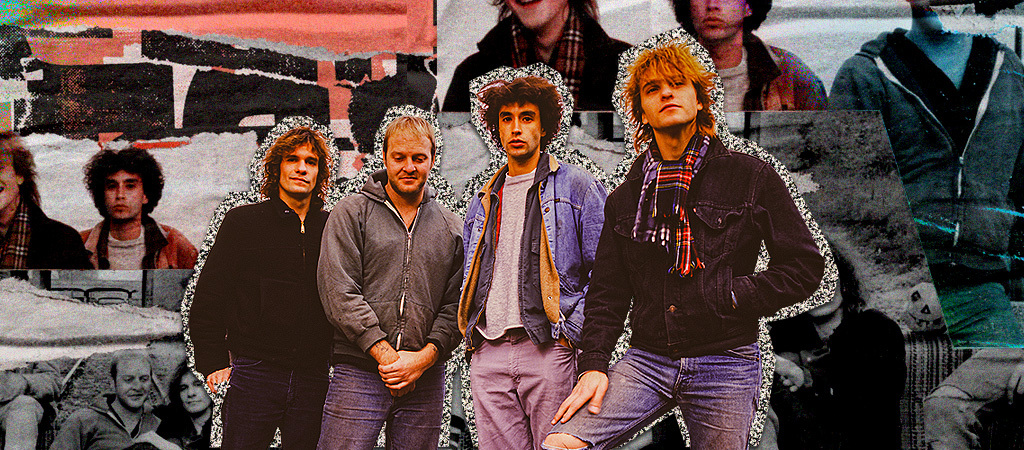Most works of art — especially these days — come into our lives quickly, make an immediate impression, and then just as rapidly disappear. In human terms, we have an acquaintance-like relationship with these films, TV shows, albums, books, etc. You get to know them on a superficial level, you make up your mind (“This was is fine” vs. “This was meh”), and you move on. Not long after, you forget about them forever.
On rare occasions, however, that acquaintance becomes a lifelong companion. You dig beneath the surface and discover the real soul underneath. You come to know this thing so well that you not only see everything that’s incredible about it, but you also recognize all the ugly flaws that weren’t apparent when your attention was fresh and fleeting. And then you begin to love the flaws, because the flaws are an essential part of the whole that you have come to adore. Or maybe you just get used to them, the way we get used to (and then forgive) the defects of the people closest to us.
More than any other popular art form, the album most lends itself to this type of evolving relationship. If a person watches the same movie 200 times, or reads the same book more than 10 times, there’s a decent chance that person either is an antisocial nerd (at best) or a would-be stalker (at worst). But it’s common to listen to the same piece of music hundreds of times over the course of your life. (Even songs you don’t like can enter your life that many times, particularly if that song is “What I Got” by Sublime.) You can only get to know the cinema or literature you love so well, but loving an album is like a marriage. You’re with it until you or your passion dies.
One of the albums to which I am married is Tim, the fourth studio LP by The Replacements. Originally released in 1985, Tim came to me in the early ’90s, back when I was a teenager who loved so-called alternative music and was going back to (what seemed at the time) the ancient roots of American independent rock. My first Replacements album was Pleased To Meet Me, and the second was Let It Be. It seemed natural to then investigate the LP that came out between those two classics. But when I checked out the Tim CD from the local library, I was immediately disappointed. Those first two Replacements albums I heard were hard-hitting rock records leavened with sensitive, introspective ballads written from the perspective of a wise-ass Midwesterner desperate to conceal how emotionally damaged he was. Tim, however, seemed relatively muted and inert. It also was quite dated sonically, which is weird since it was only six or seven years old when I heard it. But as much as I liked “Bastards Of Young” and “Left Of The Dial,” they sounded like hair metal to me, which was not cool in the grunge era.
Nevertheless, I liked a lot of the songs, particularly those sensitive, introspective ones. “Swingin Party” almost benefitted from the defanged mix, as the numb sound contrasted with the naked fear expressed by Paul Westerberg’s lyric. And then there was “Here Comes A Regular,” the album closer about aimless Middle American alcoholics sitting around waiting to die at the corner tavern, which immediately spoke to me given that I already had plenty of experience dealing with aimless Middle American alcoholics in my own family.
Thankfully, there was also room for light on Tim. I responded to the sweetness of “Kiss Me On The Bus,” and gravitated to a throwaway line (“Okay, don’t say ‘hi’ then”) that summed up Midwestern passive-aggressiveness better than anything I had ever heard or seen. (This still remains true.) I also liked the “charming asshole” routine of “Waitress In The Sky,” in part because all teenage boys go through a phase in which they aspire to become charming assholes themselves. The problem is that Paul Westerberg makes it look easy when in reality only Paul Westerberg (and perhaps Han Solo) can actually pull it off.
As I read more about The Replacements’ history, I discovered that they didn’t like how Tim sounded either. The blame fell on producer Tommy Erdelyi (aka Tommy Ramone of the band of the same name), who mixed the record. According to legend, Erdelyi supposedly had hearing problems, which affected how he shaped Tim in the album’s crucial final stages. And because Erdelyi mixed the album on headphones, he made it sound quieter and tamer than it needed to be.
By the way, Erdelyi later disputed all of this alleged “common knowledge.” He claimed Tim sounded the way it did because he wanted to make a different kind of Replacements record. He made it sound weird on purpose, he insisted.
As for me, well, like I already mentioned: I got married to Tim. It is my favorite Replacements album. Which means that I came to love it — to paraphrase another songwriter who once wrote about losers hanging out in a bar — just the way it is. I even constructed a critical argument that justified Erdelyi’s approach: The tinny guitars and clanking, ’80s-sounding drums evoke the headspace of a hungover 25-year-old having a nervous breakdown at the height of the Reagan era. The music feels distant because our unreliable narrator is alienated from his own sense of self. He starts by asking us to hold his life (because he just might lose it), and he ends in the hell of a dead-end tavern. Along the way he falls in love, confesses his insecurities, salutes college radio, and does tons of speed with a clown. The mix doesn’t make any sense because this guy’s life doesn’t make any sense.
Also, the arc of Tim — from frustration to acceptance to love — is the ultimate expression of The Replacements’ aesthetic. In this band’s world, frustration is love. If it doesn’t hurt (or confound), it isn’t real.
All of that said: I was very excited to hear Tim (Let It Bleed Edition), a new box set due out on Sept. 22. Along with packaging outtakes and an excellent live album culled from a performance at Chicago’s Metro club in January 1986, the star of the show is a new remix overseen by Erdelyi’s longtime associate Ed Stasium. (Erdelyi died in 2014).
As a lover of the original Tim, I’m not going to say that the new mix “improves” or “fixes” the album, as I don’t think it needs to be improved or fixed. However, if you ever wished that the Replacements on Tim sounded more like the explosive band they were on stage, this mix will be a deeply satisfying — even revelatory – adjunct to a record you already love.
The changes are not dramatic. According to Bob Mehr, the set’s co-producer and the band’s biographer, they haven’t replaced any of the original takes or added overdubs. What they’ve done is take out some of the treatments added to the music — like the generous helping of digital reverb — to reveal sounds that were always hiding in plain sight. This is especially apparent on the rock songs, where you can actually pick out Tommy Stinson’s fluid bass lines, which are mostly buried on the original Tim under the wash of guitars. As for the band’s troubled, late guitarist Bob Stinson, he might only appear on five songs — he was subsequently fired in 1986 — but the new mix highlights him like never before, most notably on “Little Mascara,” where his interplay with Westerberg positively soars.
Sometimes, the clarity of the mix is a little disorienting, like when backing vocals suddenly appear in the chorus of “Waitress In The Sky,” a nod to the song’s musical inspiration, Harold Dorman’s 1960 hit “Mountain Of Love.” Which is not to say those vocals don’t work, exactly, just that even the smallest change to a well-worn favorite takes some getting used to. But as Mehr told me, that’s how the band always wanted “Waitress In The Sky” to sound. It just took 38 years to get there.
“Tommy Ramone produced a great record. Steve Fjelstad engineered a fantastic-sounding record. If they hadn’t done that, the raw material wouldn’t be there. What happened is somewhere between the production of the record and it being released, the mix happened,” Mehr says. “I used to think mixing was a subordinate art form. But while you can’t make a bad-sounding recording good with a mix, you sure can make a great-sounding record sort of muted and nullified in the mix.”
But what do The Replacements themselves think about this? Given that Paul Westerberg has all but disappeared from the music industry, I figured the best person to ask was Tommy Stinson. Now 56, he was just 18 when Tim was released. But he was already playing (and living and partying) well beyond his years. When I asked him about the album, his comments were, unsurprisingly, funny, candid, insightful, a little biting, and sometimes contradictory.
What do you think about the new mix?
I think it sounds more the way it should have sounded to begin with. The funny thing is there were two records that we did that I always felt sounded terrible and this is one of them. It always sounded bad to me, and when it came out it seemed that everyone whitewashed — including the record company — that there was something wrong with it. Intrinsically, I’ve always known what was wrong with it. The original mix was mixed on fucking headphones. So I don’t suspect Ed Stasium mixing it on headphones. I don’t really know anyone that mixes on headphones, but I always knew there was a problem with that. So this is great. I’m pretty stoked on it.
One of the big improvements is that you can actually hear you on the record. You can’t really hear the bass on the original Tim.
Well that’s good … maybe. I never really thought the bass was light on it, I just thought that the overall tones of everything were just weird and weird for no good reason. Because, shit, by the time we did Tim, we’d all gotten familiar with what it looks like to mic an amp and how the studio works and the things that go along with that. But for whatever reason, it just always seemed to me like, “Wow, why does the guitar sound like it’s in a Cheerios box?” And it was weird the way no one ever made a complaint about that. No one ever really said, “Man, this record sounds weird. We should try this or we should try that.” It was strange. But all that said, I’m glad it finally got figured out.
This is a philosophical question, maybe, but now that this new version of Tim exists, in your mind is this the “real” Tim? Or is the record that came out in ’85 always going to be the record?
The record that came out in ’85 is always going to be the record. That’s the time and place. You don’t change that. Putting it out with a different mix doesn’t change that. I think what it does do is it tells you the bigger story behind what went into that record. It helps tell a story. We were in such a transitional period then that I think that whether anyone else felt it or not, no one ever pushed the envelope on it to make the mix better. It was my understanding that Ed Stasium was going to mix this record in the first place when Tommy Erdelyi was signed on to do it, but for whatever reasons he was unavailable to mix it at that time, and it was left up to Tommy to do it.
I think anyone in that scenario, if they look back now, would probably agree he wasn’t a mixer. For all he brought to the table with him, that wasn’t one of the things that was one of the strong suits. I don’t think that anyone would argue that. But it is what it is. It’s a time and place, and that was done and that’s where it was left. It’s great that we had an opportunity to put out a better sounding mix of this record. It does the story justice, I say. Leave it at that.
The appeal of the new mix is that it sounds more like the Replacements did on stage. As opposed to the original record, which is a little muted. Generally speaking, was capturing what you did on stage in the studio the band’s biggest problem when it came to recording?
That was completely it. We sounded like the records we made up to that point, but because we made the leap from indie band to major label band, it made for a confusing transition in a lot of ways. I’m pretty certain that Paul had a pretty good idea at that point that he didn’t want to work with Bob so much in the future, before we even got done making that record. I’m thinking that that’s probably where his head had been going. But when push finally came to shove, it was more about “do we stay this club band with all those shenanigans” or “do we up our game and get into the big leagues”? I think that we tried to that subconsciously. “Now that we’re big, and we’re on Warner Bros., we got to up our game a bit.” But not having anyone really guide us into that, and being left to our own devices, we sabotaged it pretty good in a lot of ways.
You mentioned your brother Bob, and it’s well known that he wasn’t around a lot during the sessions for Tim. But you can hear him loud and clear on the live album packaged on the box set. I was really struck, once again, by how inventive he could be when he was inspired.
What made Bob a great guitar player was that he was lightning in a bottle. At the right moment, he could just be crushing and fucking dead on in a way that just was awe-inspiring. And then there would be times when he really wasn’t in it, or too drunk or whatever, and it was disastrous. By the time we got to Tim, the overriding thing was that to up our game meant that we all had to be on board, and Bob really wasn’t able to make that leap. He got lost a little bit in the drugs and alcohol of it, and we couldn’t really reel him in from that. We didn’t have the ability to keep him in it. And at that point, I think Paul probably considered himself a pretty serious songwriter and that’s what he wanted to do. “This is what I’m doing, you’re either with me or against me,” that kind of thing. Bob wasn’t really up to that and Chris and I were. And there’s the history of it.
Going back to what you were saying about signing to a major label, the stigma about “selling out” doesn’t really exist anymore. An indie band signing to a corporate label isn’t controversial like it was in the 1980s and ’90s. Looking back, do you feel that making that transition actually changed the band or was that maybe more in your own heads?
I think it probably was both. We were all oddballs, but also confident oddballs, in a way. Blindly confident, even. But in the grand scheme of things, we didn’t really know what the fuck we were doing. The only stigma was to figure out what it meant to make that leap from a small little fucking indie company to a conglomerate where no one fucking even knows who the fuck you are.
The move without any help was really a problem. And mind you, we did have some people at Warner Bros. at the time that were very helpful and really tried as much as you could to corral four young, awkward, mischievous young people. There was just a lot of self-sabotage. And we killed ourselves in that regard.
I should mention that Tim is my favorite Replacements album. I think it’s a lot of people’s favorite Replacements album. How do you feel about it?
I don’t feel like it’s our greatest record at all. I think that we made the best record we could at that time. Going into that record, we’d been touring so much that I really don’t even know how they scrounged up all these extra tracks and bullshit. It just seems to me that by the time we got there, I don’t think we were really completely ready to make that record when we made it. Hence, I think there are some great songs on there that everyone loves, of course, a good handful of them. But then there’s some also real filler. Like “Dose Of Thunder” isn’t a classic great Replacements song by any stretch. There are a couple of other ones that aren’t so great either. But it was the best we had at that time and the best Paul had up his sleeve.
One of those outtakes uncovered in the box set is one of your first songwriting efforts, “Having Fun,” which is a cool little rock ‘n’ roll song. How was your own songwriting evolving at the time?
I’d had the bug for a bit and was starting to get curious about figuring out what it was I wanted to do with it and how that may or may not fit the band mold. To be fair, Paul was always really encouraging to both Chris and I and even Bob for that matter — “you got a song, bring it,” that kind of thing. But obviously we couldn’t compete with what he had already set the groundwork for, because he was our main songwriter. So we would try things and go, “Okay, so I’m not quite ready for that yet, but thanks for fucking hanging out and working on it and let’s move on.” To our detriment, in the early days, one of the things we didn’t do a whole lot was toil with material so much. We were pretty much off the cuff when it came to recording, writing, and producing records. Whereas some people do a thousand takes of a fucking song before they get that thousand and one take that makes the single, we weren’t really able to do that. We did it to a degree, but we always had diminishing returns after a few handfuls of takes.
One of the big “what if’s?” with Tim concerns Alex Chilton, who worked briefly with you guys right before the proper Tim sessions and recorded the version of “Left Of The Dial” that made the record. What are your memories of Alex, and did he come close to producing the album?
Well, we were enamored with him because of the obvious. We were Big Star fans. When we hooked up with him, he was off in the darkness. I’m not saying this in a negative way, but I think he was working at Tipitina’s in New Orleans or some other venue down here, mopping floors and stuff. He was, for all intents and purposes, forgotten.
I think we were enamored with what he knew and what we adored about his music, and he in turn came to the table stumped by what the fuck we wanted out of him. The reason why it didn’t work is because we really did need a producer, someone to wrangle this whole thing a little bit and he just wasn’t the cat for it. Bob was a bit of a loose cannon and Peter Jesperson was half out the door with R.E.M. We were lost a little bit there.
Do you recall why “Can’t Hardly Wait” didn’t make the album?
Paul always knew it had something special about it, but it wasn’t ready for prime time. And that is how we made our records. Paul was very much about the vibe of the song. If we play a song through three or four times and it wasn’t feeling right, it didn’t happen. If it felt right and it felt like we had something to work with, then we could complete it. But for the most part, our best records we made mostly live. We didn’t fuck around with a whole lot of overdubbing in that regard until later on.
You said you thought there were two Replacements albums that sounded terrible. I assume the other one is Don’t Tell A Soul?
Correct.
That album was remixed on the Dead Man’s Pop box. There have been a lot of Replacements box sets lately.
To be honest with you, I would’ve never done any of them. For us guys in the band, I think that the last thing we want is outtakes out there for the world to hear. There’s a reason why they’re not on the record in the first place. But in the grand scheme of things, our fan base likes the story and so they want to know more.
What is comprised of these box sets tells a bigger story about each record. I’m the sort of person that was into that myself. I’m into the deep cuts. I remember fucking Peter Jesperson playing me a bootleg of “Who Killed Davey Moore” by Bob Dylan years and years and years ago. And I remember thinking, “Wow, we’re in a whole other level here where we’re digging in to try and get the bigger picture of what this is about.” Whether it was Bob Dylan or The Clash or whoever.
So, being a music fan, I understand the want for that. As an artist, I don’t see the want for that. So there’s a push and pull on that. The fans want to hear it and they’re into it and it makes it a good story for them, and so there’s a reason to do it. And I stay out of it in that regard because I am on the other side of that fence from the fans. I think between the people involved and putting these things out and getting behind them, they’re serving the fans’ wants and needs, and I’m grateful that we’re still uniquely relevant musically to make that want and need there.
The Replacements are Warner Music artists. Uproxx is an independent subsidiary of Warner Music Group.



 (@electriczoony)
(@electriczoony)





 (@FIBAWC)
(@FIBAWC) 



